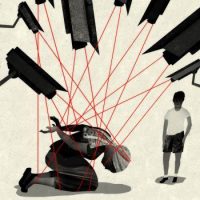
La peste y la ignorancia
«La peste es la ignorancia. Eso es lo que verdaderamente acabará con el hombre». Sólo por esta frase merece la pena ver la serie. Cuesta trabajo encontrar ejemplo más acabado de profecía autocumplida.
Hay que comenzar haciendo caso omiso a detalles de atrezzo que se clavan como aguijones, verbigracia, esas velas rojas. Nada menos que rojas, con lo caro que era teñir la cera. Se ve que había rebajas en el Todo a un euro (antiguo Todo a cien; conviene aclararlo para los que tengan poco sentido de la Historia) de la esquina. Hay luces encendidas por todas partes y a todas horas, incluso de día.… Seguir leyendo »












